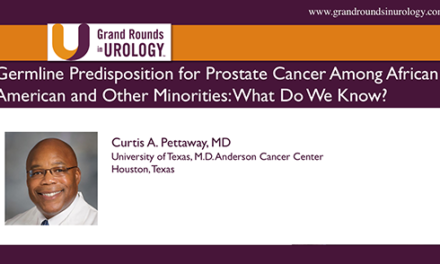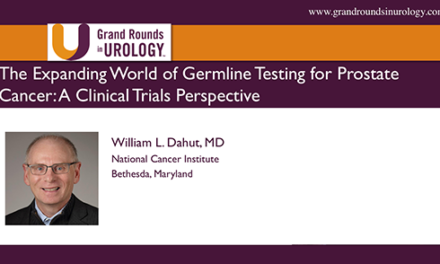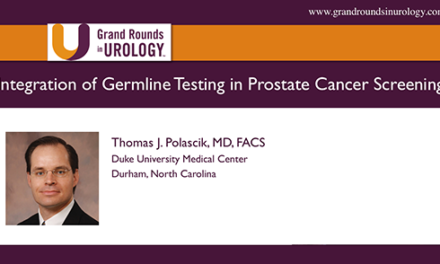E. David Crawford, MD, Editor-in-Chief of Grand Rounds in Urology, and Alan H. Bryce, MD, Chair of the Division of Hematology and Medical Oncology and Assistant Professor of Medicine at the Mayo Clinic in Phoenix, Arizona, presented a Point-Counterpoint on “There is a Role for Currently Available Biomarkers/Genomics in the Risk Stratification of Prostate Cancer” at Perspectives in Urology: Point-Counterpoint 2019 to discuss their differing viewpoints on the relative value of genomics and biomarkers in prostate cancer risk stratification.
After viewing the three presentations, be sure to vote on which presenter’s view you support.
Point-Counterpoint – Pro: There is a Role for Currently Available Biomarkers/Genomics in the Risk Stratification of Prostate Cancer – Summary:
E. David Crawford, MD, Editor-in-Chief of Grand Rounds in Urology, argues that doctors need to do biomarker testing to know which patients to biopsy, follow closely, and treat with radiation. He discusses how doctors should test early for BRCA mutations to know which patients will have more aggressive cancers. Biomarkers are helpful for determining prognosis and management strategy and, therefore, using them may lead to increased survival rates for prostate cancer patients.
Point-Counterpoint – Con: There is a Role for Currently Available Biomarkers/Genomics in the Risk Stratification of Prostate Cancer – Summary:
Alan H. Bryce, MD, Chair of the Division of Hematology and Medical Oncology and Assistant Professor of Medicine at the Mayo Clinic in Phoenix, Arizona, argues that although germline testing is beneficial, other biomarker tests have inconsistent results for prostate cancer patients. These biomarker tests help manage the psychological part of fighting cancer by overcoming indecisiveness and giving patients a false sense of security. He argues that results provided by biomarkers can lead to misinterpretations and, therefore, biomarkers should be evaluated together with other tumor-related features and patient characteristics.
How to cite: Crawford, E. David. Bryce, Alan H. “Point-Counterpoint: There is a Role for Currently Available Biomarkers/Genomics in the Risk Stratification of Prostate Cancer” April, 2020. Accessed Dec 2024. https://dev.grandroundsinurology.com/point-counterpoint-there-is-a-role-for-currently-available-biomarkers-genomics-in-the-risk-stratification-of-prostate-cancer/
[yop_poll id=”4″]
About the Authors
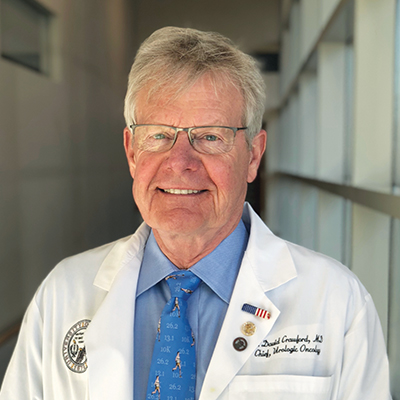
E. David Crawford, MD
E. David Crawford, MD, is an internationally renowned urologist and an expert in benign prostate hypertrophy, urologic cancers, and in particular, prostate cancer. He has authored many scientific articles, as well as textbook and book chapters. He is an editorial reviewer or consultant for many publications, including Urology, the Journal of Urology, and the Journal of Clinical Oncology. Dr. Crawford is a member of many organizations, including the American Society of Clinical Oncology (ASCO), the American Urological Association (AUA), and the American Association for the Advancement of Science (AAAS). He is the Founder and Chairman of the Prostate Conditions Education Council, which is responsible for raising awareness and screening millions of men for prostate health issues. He has received many awards, including the CaP Cure Annual Award for Scientific Presentation, and has twice been presented with a “Freddie Award” for best medical documentary. He has long been recognized as one of the Best Doctors of America, and is recognized by Men’s Health Magazine as one of the top 20 urologists for men in the country.
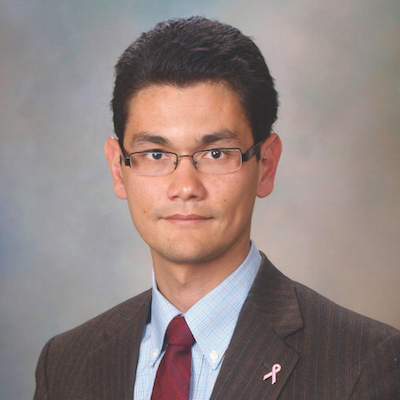
Alan H. Bryce, MD
Dr. Bryce studies cancer genetics and novel therapeutics with a focus on personalized medicine. His clinical practice focuses on genitourinary malignancies (prostate, kidney, bladder, and testicular cancers) and melanoma. He is Chair of the Division of Hematology and Medical Oncology and Assistant Professor of Medicine at Mayo Clinic in Phoenix, Arizona. He is also the Medical Director of the Genomic Oncology Clinic at Mayo Clinic Arizona, where he utilizes whole genome sequencing of tumors to identify key driver mutations. This approach allows for precise targeting of a patient’s tumor, leading to a greater chance of remission. Dr. Bryce participates in community outreach to underserved populations and has in interest in health disparities research. He also conducts Phase I clinical trials of new cancer drugs.
About Perspectives in Urology: Point Counterpoint
Perspectives in Urology: Point Counterpoint (PCP) is an annual, multi-day, CME-accredited conference devoted to discussing and debating the latest topics in men’s health and general urology, as well as management of bladder, renal, and both localized and advanced prostate cancer. More than didactic lectures, the conference’s format includes debates, point-counterpoint discussion panels, and unique case-based presentations. Dr. Crawford and Dr. Bryce presented these lectures during the 28th PCP in 2019. Please visit this page in order to register for future PCP meetings.
ABOUT THE AUTHOR
Researcher-physician E. David Crawford, MD, has devoted his career in medicine to educating the public about men's health issues and finding effective techniques and procedures to address prostate cancer, the most common malignancy affecting men in the United States.
He is currently a Professor of Urology at the University of California, San Diego, and emeritus distinguished endowed Professor of Surgery, Urology, and Radiation Oncology, and Head of the Section of Urologic Oncology at the University of Colorado Anschutz Medical Campus in Aurora, Colorado. Dr. Crawford received his medical degree from the University of Cincinnati and his postgraduate training included an internship and residency in urology at the Good Samaritan Hospital in Cincinnati. He subsequently completed a genitourinary cancer fellowship at the University of California Medical Center in Los Angeles.
Dr. Crawford is an internationally recognized expert in benign prostate hypertrophy, urologic cancers, and in particular, prostate cancer. He has conducted research in the treatment of advanced bladder cancer, metastatic adenocarcinoma of the prostate, hormone-refractory prostate cancer, and other areas of urological infections and malignancies. He has authored or coauthored over 810 scientific articles, has published seven textbooks, authored over 60 book chapters, and provided more than 2,200 educational talks for patients and physicians.
In an effort to raise public awareness about prostate health, Crawford in 1989 founded the Prostate Conditions Education Council (PCEC). The non-profit organization is comprised of a consortium of leading physicians, health educators, scientists, and men's health advocates. PCEC's advocacy for free or low-cost prostate screening has affected the lives of millions of American men. He currently chairs the PCEC.
Crawford is an active member of many national and international organizations, including the American Society of Clinical Oncology, the American Urological Association (AUA), and the American Association for the Advancement of Science. Within the AUA, he has been a member of the Committee to Study Urologic Research Funding and the prostate cancer clinical trials subcommittee. Crawford served on the board of governors, the scientific advisory board of the Southwest Oncology Group, and was chairman of the Genitourinary Cancer Committee for 27 years. This group is the largest clinical trials group in the world.
Crawford's involvement in the national prostate cancer arena has been widely recognized. He has received many honors and awards, including the CAP Cure Annual Award for Scientific Presentation in 1999 In 1997, he was presented with a 'Freddie Award" at the AMA International Health and Medical Film Competition for the program, ITV: The Cutting Edge Medical Report (Prostate Cancer: Understanding, Diagnosing, and Defeating), which Crawford hosted with special guest, retired General Norman Schwarzkopf.
Crawford again won a prestigious 'Freddie Award" 5 years ago... He is a member of Best Doctors of America and was named Healthcare Provider of the Year in the Denver Metro area by the Denver Business Journal.
He has been recognized as one of the Best Doctors of America for the past two decades and is recognized as one of the top 20 urologists in the country, for men, by Men’s Health Magazine. In 2018 he received the honor of being named the Distinguished Alumnus of the Year from the University of Cincinnati School of Medicine. In May of 2019, he received the Presidential citation from the American Urological Association recognizing for his “tireless role in genitourinary cancer research that has benefited countless urologic cancer patients.” He accepted the position of Editor in Chief of Grand Rounds in Urology in June of 2019. In 2021, he was the recipient of the Merle Stringer, M.D. annual award for excellence in medicine by the Florida State Medical Association.

